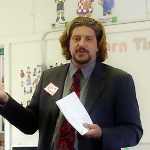 It’s 6 p.m. Sunday, May 4, 2014, in a quiet exurb of the San Francisco Bay Area. Four shots ring out, and lying dead in the doorway of his mother’s modest apartment is 18-year-old Oscar Herrera, a baseball bat in hand. The shooter? A local peace officer summoned to the house by Herrera’s mother on a domestic disturbance call. Herrera greeted the officer at the door with the aforementioned baseball bat, took a swing at the officer with deadly intent, and the officer drew his weapon and shot Herrera dead. The rest of the details are all too familiar: Herrera, a product of public assistance, subsidized housing, the public schools’ Special Education program and a single mother, had been in heaps of trouble with the law recently for drugs and resisting arrest. At the time of the shooting, Herrera was high on either methamphetamine or bath salts (the toxicology report is still in the works).
It’s 6 p.m. Sunday, May 4, 2014, in a quiet exurb of the San Francisco Bay Area. Four shots ring out, and lying dead in the doorway of his mother’s modest apartment is 18-year-old Oscar Herrera, a baseball bat in hand. The shooter? A local peace officer summoned to the house by Herrera’s mother on a domestic disturbance call. Herrera greeted the officer at the door with the aforementioned baseball bat, took a swing at the officer with deadly intent, and the officer drew his weapon and shot Herrera dead. The rest of the details are all too familiar: Herrera, a product of public assistance, subsidized housing, the public schools’ Special Education program and a single mother, had been in heaps of trouble with the law recently for drugs and resisting arrest. At the time of the shooting, Herrera was high on either methamphetamine or bath salts (the toxicology report is still in the works).
The last time I saw Oscar was eight years ago — a smiling, quiet, reserved boy with a 10,000-watt smile. His personality sweet to a fault, with hugs for all, he was leaving our after-school program because he was being transferred to another school within the district to complete his fifth grade year in yet another Special Education classroom.
The news of Oscar’s death hit me like a ton of bricks.
I’m always preaching and sermonizing about how the foundation, the raison d’etre, of Out-of-School Time (OST) programming is the social and emotional development of youth. How could this young, sweet boy, in the span of eight years, have slipped through the cracks? What did we miss? What could we have done differently that would have prevented this tragedy?
In the 25-plus years I’ve been professionally involved in the OST field, I’ve had the humbling honor and privilege of caring for literally tens of thousands of young people. My track record isn’t bad: I’ve cared for future MIT and Stanford graduates, a world-famous movie actor, one of America’s top up-and-coming ballet and jazz dancers, two high-level Facebook executives and a top collegiate football and baseball player. I’m sure I could add to the list, but it’s been impossible to keep up with everyone.
Other than a 16-year-old who was killed in a tragic, but completely accidental automobile crash, Oscar is the first former student I’ve known that has died. And the desperate facts and circumstances around his death sadden me. They make me rethink and second guess my day-to-day interactions with the youth in my care.
While I am firm in my commitment to the principle of caring for each student for whom I am entrusted to care, develop and teach, the death of Oscar Herrera has brought a significance and meaning to my daily practice that I would like to share with all adults who work with children and youth: We are here to make a difference in the lives of the students with whose well-being we are sacredly entrusted.
Wherever we work in the field of education, whether as a public school teacher, an OST practitioner, a coach or a Sunday School teacher, our greatest striving should be to make a difference; we need to commit to leaving the lives of these children and youth better than they were before. At the root of it all, we must endeavor to – one student at a time – create a better world, for them, for ourselves, and for humanity. If not, for what purpose are we here?
While it is impossible to pre-navigate the infinite and unformed future, children and youth such as Oscar show us that our work is not done. Each day, each moment, that we spend planning, programming and interacting with the youth in our lives is giving birth to the next; we are forming the unformed future with today’s thoughts and actions. It is imperative that we think and act with intention.
When you show up to work today, whatever your job or task, remember that on this day you have the conscious opportunity to make a difference. Don’t take that obligation lightly.
“A teacher affects eternity; she can never know where her influence stops.” – Henry Brooks Adams
Rick Rood is a 25-year front-line veteran of the Out-of-School-Time profession and author of the book Games Teachers Play Before the Bell Rings.





























